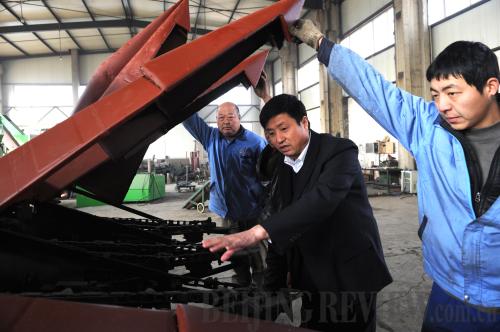|
 |
|
FARMER-TURNED-INVENTOR: Guo Yufu (center), a farmer in Wuqing District of Tianjin, talks with technicians about how to improve the corn harvester he invented, on February 5, 2010. Guo was given the National Scientific and Technological Progress Award for his invention in January 2010 (MA PING) |
The Chinese Government established the annual State Science and Technology Awards in 2000 to recognize individuals and organizations for their outstanding contributions to scientific and technological development.
According to Yin, the State Scientific and Technological Progress Award, one of the five major categories of the State Science and Technology Awards, was particularly problematic.
The award honors project teams. But the names of many administrative officers are reportedly often put on application materials together with the names of the scientists who have actually done the research. Data from the National Office for Science and Technology Awards show, from 2000 to 2009, this award was given to 24,555 individuals working on 2,388 projects in 7,306 research institutions.
Except for the International Scientific and Technological Cooperation Award that honors foreigners or international organizations, the other three categories of the State Science and Technology Awards, namely the State Supreme Science and Technology Award, the State Natural Science Award and the State Technological Innovation Award, had a total of 3,174 recipients during the same period.
Breakthrough points
"To establish a sound scientific and technological awards system, it is important to streamline the relationship between government departments and academic communities and between the administrative and academic divisions of research institutions," Qi said.
According to Guo, redefining the functions of relevant government departments should be the top priority in any reform of the state-sponsored awards system.
"Government departments should neither do too much nor do too little," Guo said. He argued that while the government should avoid micromanaging projects it should make an effort to implement plans and policies that encourage and enable China's scientists.
The senior mathematician was particularly critical of the fact that the State Science and Technology Awards are not field-specific.
"Achievements in various fields are lumped together. Though many outstanding experts are invited to participate in the evaluation, they are unable to adequately assess the value of projects in areas beyond their knowledge. So the experts usually tend to rely on quantitative standards," Guo said.
"The inability of government departments to adequately evaluate projects in various fields also gave dishonest scholars the opportunity to cheat," he continued.
In terms of a comprehensive reform, Guo suggested that the government should distribute awards to only a small number of exceptional scientists. Findings from specific projects, he argued, should be evaluated and rewarded by academic communities and the market.
"Findings from basic research should be judged by their academic value or contribution to scientific and technological development, and should be mainly assessed by recognized academic institutions, whereas findings from applied research should be appraised according to its effects after application, and should be primarily evaluated through market mechanisms," Guo said.
Guo's suggestion is echoed by Hou Jianguo, President of the University of Science and Technology of China. Hou said China should streamline its numerous and complicated science awards.
Yet the idea of letting the market and the public pick the winners and removing government awards entirely sounds "a little too drastic" to officials within the National Office for Science and Technology Awards.
In an interview with Beijing-based Outlook weekly, an anonymous official with the office said, "If the State Science and Technology Awards were abolished, how would the government recognize the contribution of science and technology to economic and social development?"
Many researchers have also expressed concerns that most industry associations and NGOs are incapable of conducting unbiased evaluations, as the leaders of such organizations are mostly incumbent or retired government officials.
"The problem is that these institutions are also managed like government departments, and administrative staff monopolize the power to allocate resources," said Ma Dalong, a Peking University professor.
Zhu Lilan, former Minister of Science and Technology, has called for redefining the evaluation criteria for government science and technology awards since 2009. She also suggests members of juries for the awards should be carefully chosen, evaluated and regularly reshuffled.
Zou Dating, Director of the National Office for Science and Technology Awards, said in June stricter measures had been taken to ensure that recipients of this year's State Science and Technology Awards were selected in a "clean and fair" way.
One of the new measures introduced is to keep the judges anonymous. Judges and other members of the evaluation committee are now required to use their code names when reporting for duty and evaluating each others' performances. | 